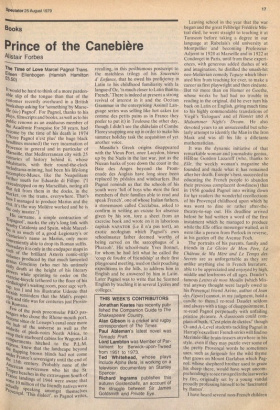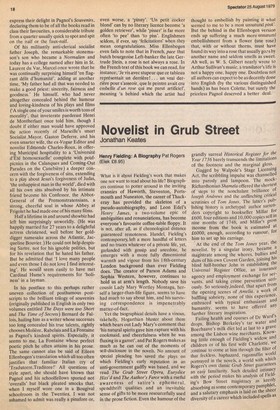Prince of the Canebiere
Al istai r Forbes
'The Time of Love Marcel Pagnol Trans. Eileen Ellenbogen (Hamish Hamilton Z5.50) It would be hard to think of a more pardonable slip of the tongue than that of the customer recently overheard in a British bookshop asking for 'something by Marseille (sic) Pagnol'. For Pagnol. thanks to his Plays, filmscripts and books, as well as to his Public renown as an assiduous member of Lthe Academie Francaise for 30 years, had Yecome by the time of his death in 1974 headlines Pagnol n'est plus' the huge black neadlines moaned) the very incarnation of Provence in general and in particular of Marseille, that Mediterranean city with 25 centuries of history behind it, whose inhabitants, with their round-the-clock inelodrama-miming, had been his life-long ,accomplice-Muses, like the Neapolitans lurther south for Eduardo di Fillip°. CI eavesdropped on my Marseillais, noting all that fell from them in the docks, in the, Inarket, on the trams, everywhere. That's 'low I managed to'produce Marius and the riest. It's the way Moliere worked and he is the only master.') His surname, a simple contraction of sPagnol', marks the city's long link with it!arbY Catalonia and Spain, while Marceln'S is as much of a, good Legionary's or ‘-enturion's name as Marius, only more cm(Inveniently able to drop its Roman suffix. 'l°wadays it is only in the endpaper maps in each of the brilliant Asterix comic-strip Volumes produced by that much lamented early Goscinny (who met his untimely death at the height of his literary _Powers while sprinting to order on the clereise-bicycle tethered to the floor of his sahrdiolOgist's waiting room, poor sap: verb. fir too ) and his illustrator Uderzo that snnish reminders that the Midi's .proper ci`Yle and title was for centuries just Provin aRprnana.
ew of the posh proconsular P&O pasb'engers who chose the Rhone-mouth port, theentne since de Lesseps's canal once more mid Falb of the universe as well as the sw wife of pieds-noirs North Africa, to c_al) their starboard cabins for Wagons-Lit ZinPartments hitched to the P.L.M. vti'lePress, knew that the landscape beyond ute, napping brown blinds had not come th 4er France's sovereignty until the end of A"! 15th century. Probably none of the T"nerican servicemen who hit the St. F,..1_0Pez beaches in the extravagant South of Lanee landings of 1944 were aware that s 10 million of the friendly natives were ;Lir° ally speaking amongst themselves vencal. 'This dialect', as Pagnol writes, recalling, in this posthumous postscript to the matchless trilogy of his Souvenirs Enfance, that he owed his proficiency in Latin to his childhood familiarity with la langue d'Oc, is much closer to Latin than to French.' There is indeed at present a strong revival of interest in it and the Occitan Grammar in the enterprising Assimil Language series was selling like hot cakes (or comme des petits pains as in France they prefer to put it) in Toulouse the other day, though I didn't see the chatelain of Combe Florey snapping one up in order to make his summer holiday task the acquisition of yet another voice.
Massilia's Greek origins disappeared with the Vieux Port, once Lacydon, blown up by the Nazis in the last war, just as the Nicean barks of yore down the coast in the Baie des Anges beyond the Promenade des Anglais have long since been replaced by pedalos and windsurfers. But Pagnol reminds us that the schools of his youth were 'full of boys who were the first members of their families able to read and speak French', one of whose Italian fathers, a stonemason called Cacciabua, asked to confirm in writing an excuse for absence given by his son, tore a sheet from an exercise book and wrote on it in laborious capitals NAPATOR (i.e il n'a pas tort), an exotic neologism which Pagnol's own schoolmaster father deemed 'worthy of being carved on the sarcophagus of a Pharaoh'. His school-mate Yves Bonnet, for whom he had felt what he called the 'coup de foudre of friendship' at their first playground meeting, used on their poaching expeditions in the hills, to address him in English and be answered by him in Latin. Later Pagnol was to write that he 'learned English by teaching it in several Lycees and colleges.' Leaving school in the year that the war began and the great Felibrige Frederic Mistral died, he went straight to teaching it at Tarascon before taking a degree in our language at Rabelais's old university at Montpellier and becoming ProfesseurAdjoint in 1920 at Marseille and in 1922 at Condorget in Paris, until from these experiences, with generous added dashes of wit and imagination, he distilled the smash-hit neo-Molierian comedy Topaze which liberated him from teaching for ever, to make a career as first playwright and then cineaste. But no more than on Homer or Goethe, whose works he had had no trouble in reading in the original, did he ever turn his back on Latin or English, giving much time to his highly commendable translations of Virgil's 'Eclogues' and of Hamlet and A Midsummer Night's Dream. He also devoted years to an unsuccessful but scholarly attempt to identify the Man in the Iron Mask and was all his life a clilletante mathematician.
It was the dynamic initiative of that remarkable woman and journalistic genius, 1-161&ie Gordon Lazareff (who, thanks to Elle, the weekly woman's magazine she founded and made what it has remained after her death, Europe's best, succeeded in educating the French people to abandon their previous complacent dowdiness) that in 1956 goaded Pagnol into writing down for tier readers the wonderful recollections of his Provencal childhood upon which he was wont to dine or rather after-thetheatre-to-sup out. His deadline arrived before he had written a word of the first instalment which he managed to produce while the Elle office messenger waited, as it were like a person from Porlock in reverse, in his garden off the Avenue Foch.
The portraits of his parents, family and friends in La Gloire de Mon Pere, Le Château .de Ma Mere and Le Temps des Secrets are as unforgettable as they are unlike anything else in French literature, able to be appreciated and enjoyed by high, middle and lowbrows of all ages. Daudet's famous Lewes de mon Moulin (which Mistral anyway thought were largely owed to his Provencal friend Arene, author of Jean des Figues) cannot, in my judgment, hold a candle to them.] re-read Daudet seldom and always with a tinge of disappointment. I re-read Pagnol perpetually with unfailing pristine .pleasure. A classroom could complain of both, 'C'est plein de dictees!' though 0and A-Level students tackling Pagnol in Harrap's excellent French series will find no Merimee-like brain-teasers anywhere in his style, even if they may puzzle over some of the pretty Provencal words he sometimes uses, such as fitrigouk for the wild thyme that grows on Mount Garlaban which Pagnol, whose shepherd brother used to graze his sheep there, would have wept uncomprehendingly to see ravaged in the last weeks by fire, originally set by a young vandal proudly professing himself to be 'fascinated by flames'.
I have heard several non-French children express their delight in Pagnol's Souvenirs, declaring them to be of all the books read in class their favourites, a considerable tribute from a quarter usually quick to spot and spit on the naïf or the faux-naïf.
Of his militantly anti-clerical socialist father Joseph, the remarkable stonemason's son who became a Normalien and today has a college named after him in St. Laurent du Var, Marcel once wrote that he was continually surprising himself 'en flagrant delft d'humanite, adding at another time, 'My father had all that was needed to make a good priest; sincerity, fairness and goodness.' He himself, who had never altogether concealed behind the humour and loving-kindness of his plays and films CA single one of your smiles is worth tons of morality', that inveterate paederast Henri de Montherlant once told him, though I doubt if either man would have approved the action recently of Marseille's smart Socialist .Mayor, Gaston Deferre, and his even smarter wife, the ex-Vogue Editor and novelist Edmonde Charles-Roux, in offering Municipal hospitality to a 'Universite d'Ete homosexuelle' complete with poufpicnics in the Calanques and Coming-Out Parades on the Canebiere) a deeper concern with the forgiveness of sins, extending to a play about Jesus's forgiveness of Judas, 'the unhappiest man in the world', died with all his own sins absolved by his intimate friend become his Confessor, the AbbotGeneral of the Premonstratensians, a strong, cheerful soul in whose Abbey at Frigolet he had made one of his many films.
Half a lifetime in and around showbiz had left him surprisingly unworldly. (He was happily married for 27 years to a delightful actress christened, well before her golddigger namesake across the Atlantic, Jacqueline Bouvier.) He could not help despising Sartre, not for his ignoble politics, but for his revelation that he hated his father. But he admitted that 'I love many people and even those I do not love I find interesting'. He woula seem easily to have met Cardinal Hume's requirements for 'holiness' in a layman.
In his postface to this perhaps rather uneven collection of posthumous postscripts to the brilliant trilogy of souvenirs (originally published in English in only two volumes entitled The Days were too Short and The Time of Secrets) Bernard de Fallois, hailing him as a writer whose successes too long concealed his true talents, rightly chooses Moliere, Rabelais and La Fontaine as Pagnol's kindred spirits. Especially, it seems to me, La Fontaine whose perfect poetic pitch he often attains in his prose. The same cannot alas be said of Eileen Ellenbogen's translation which all too often justifies that familiar Italian cry of `Tradutorre,Traditore I' All questions of style apart, she should have known that Pagnol and his schoolfellows sported not 'overalls' but black pleated smocks that, when I myself wore one in a Bougival schoolroom in the Twenties, I was not ashamed to admit was really a pinafore or, even worse, a 'pinny'. 'Un petit cocker blond' can by no literary licence become 'a golden retriever', while `pisser' is far more often 'to pee' than `to piss'. Englishmen seldom, if ever, say 'felicitations' when they mean congratulations. Miss Ellenbogen even fails to note that in French, pace that butch bourgeoise Left-banker the late Gertrude Stein, a rose is not always a rose. In the French text of this book we can read, for instance; `Je vis avec stupeur que ce tableau representait un derriere! . . . un vrai derriere pour s'asseoir, que le peintre avait cru embellir d'un rose qui me parut artificia, meaning 'a behind which the artist had thought to embellish by painting it what seemed to me to be a most unnatural pink'. But the behind in the Ellenbogen version ends up suffering a much more unnatural embellishment from a flower (une rose) that, with or without thorns, must have found its way into a rose that usually go:s by another name and seldom smells as sweet. Ah well, as W. S. Gilbert nearly wrote to Arthur Sullivan's music, a translator's life is not a happy one, happy one. Doubtless not all authors can expect to be as decently done into English (by the various distinguished hands) as has been Colette, but surely the priceless Pagnol deserved a better deal.































 Previous page
Previous page